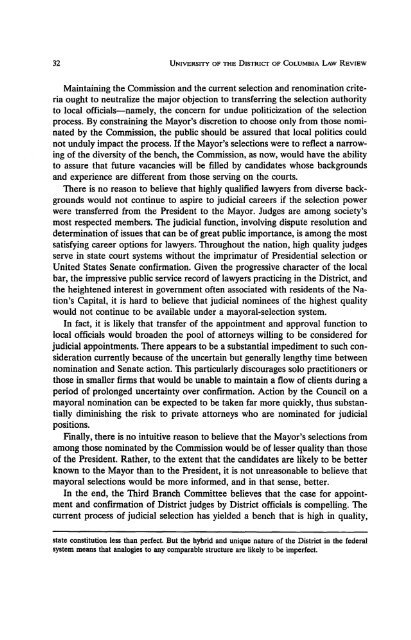Download Electronic Version - UDC Law Review
Download Electronic Version - UDC Law Review
Download Electronic Version - UDC Law Review
Create successful ePaper yourself
Turn your PDF publications into a flip-book with our unique Google optimized e-Paper software.
32 UNIVERSITY OF THE DISTRICf OF COLUMBIA LAW REVIEW<br />
Maintaining the Commission and the current selection and renomination criteria<br />
ought to neutralize the major objection to transferring the selection authority<br />
to local officials-namely, the concern for undue politicization of the selection<br />
process. By constraining the Mayor's discretion to choose only from those nominated<br />
by the Commission, the public should be assured that local politics could<br />
not unduly impact the process. If the Mayor's selections were to reflect a narrowing<br />
of the diversity of the bench, the Commission, as now, would have the ability<br />
to assure that future vacancies will be filled by candidates whose backgrounds<br />
and experience are different from those serving on the courts.<br />
There is no reason to believe that highly qualified lawyers from diverse backgrounds<br />
would not continue to aspire to judicial careers if the selection power<br />
were transferred from the President to the Mayor. Judges are among society's<br />
most respected members. The judicial function, involving dispute resolution and<br />
determination of issues that can be of great public importance, is among the most<br />
satisfying career options for lawyers. Throughout the nation, high quality judges<br />
serve in state court systems without the imprimatur of Presidential selection or<br />
United States Senate confirmation. Given the progressive character of the local<br />
bar, the impressive public service record of lawyers practicing in the District, and<br />
the heightened interest in government often associated with residents of the Nation's<br />
Capital, it is hard to believe that judicial nominees of the highest quality<br />
would not continue to be available under a mayoral-selection system.<br />
In fact, it is likely that transfer of the appointment and approval function to<br />
local officials would broaden the pool of attorneys willing to be considered for<br />
judicial appointments. There appears to be a substantial impediment to such consideration<br />
currently because of the uncertain but generally lengthy time between<br />
nomination and Senate action. This particularly discourages solo practitioners or<br />
those in smaller firms that would be unable to maintain a flow of clients during a<br />
period of prolonged uncertainty over confirmation. Action by the Council on a<br />
mayoral nomination can be expected to be taken far more quickly, thus substantially<br />
diminishing the risk to private attorneys who are nominated for judicial<br />
positions.<br />
Fmally, there is no intuitive reason to believe that the Mayor's selections from<br />
among those nominated by the Commission would be of lesser quality than those<br />
of the President. Rather, to the extent that the candidates are likely to be better<br />
known to the Mayor than to the President, it is not unreasonable to believe that<br />
mayoral selections would be more informed, and in that sense, better.<br />
In the end, the Third Branch Committee believes that the case for appointment<br />
and confirmation of District judges by District officials is compelling. The<br />
current process of judicial selection has yielded a bench that is high in quality,<br />
state constitution less than perfect. But the hybrid and unique nature of the District in the federal<br />
system means that analogies to any comparable structure are likely to be imperfect.














